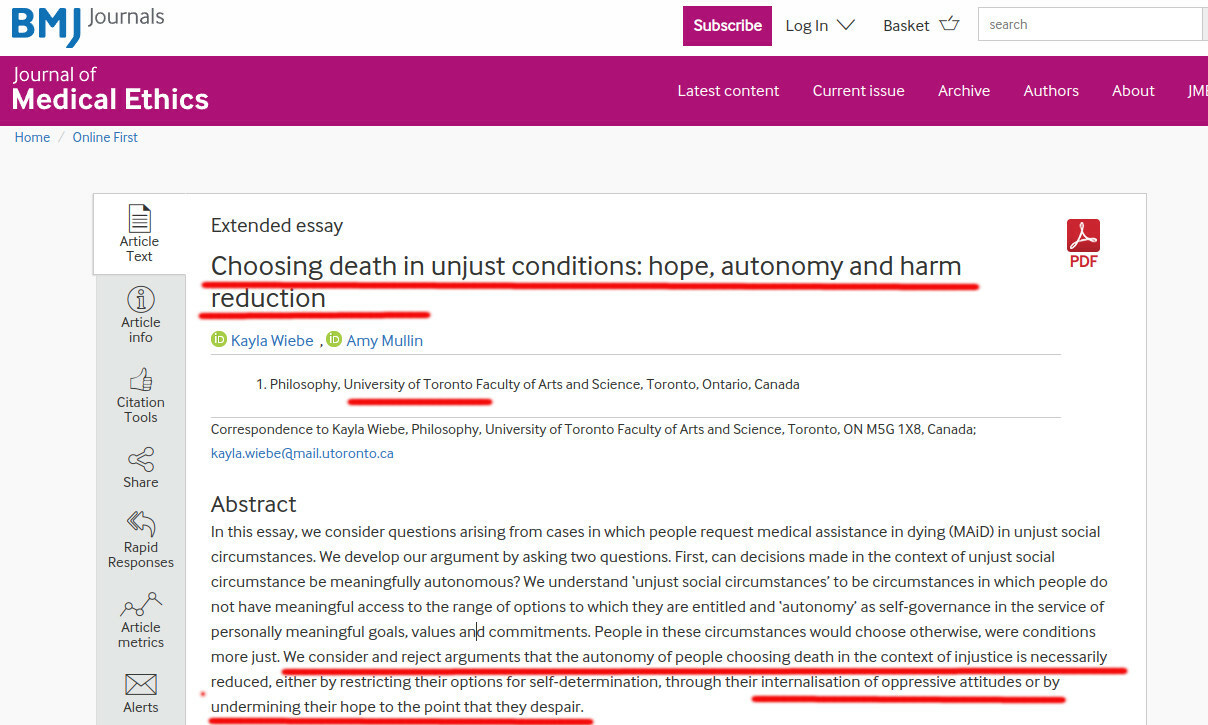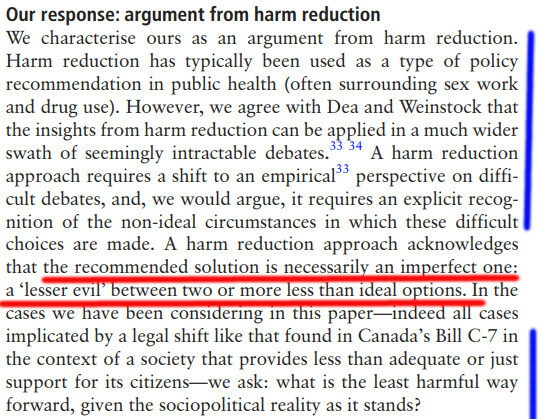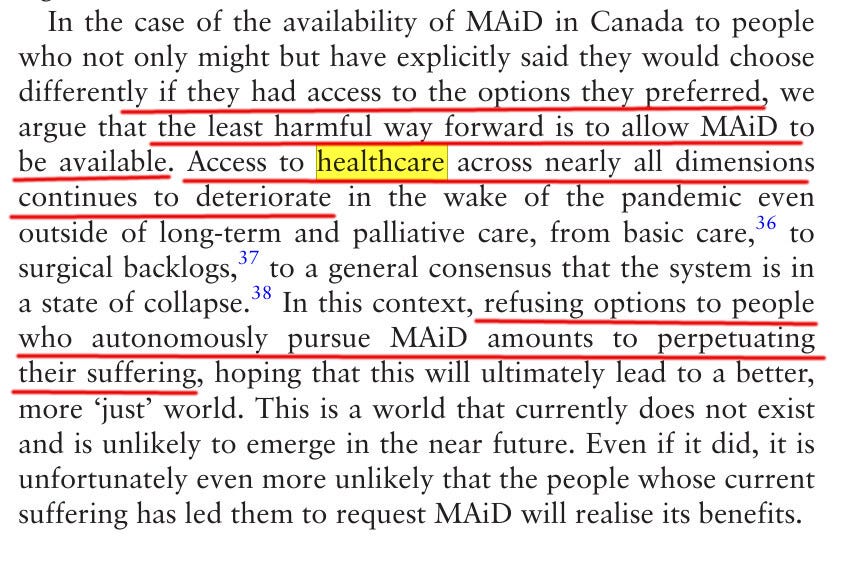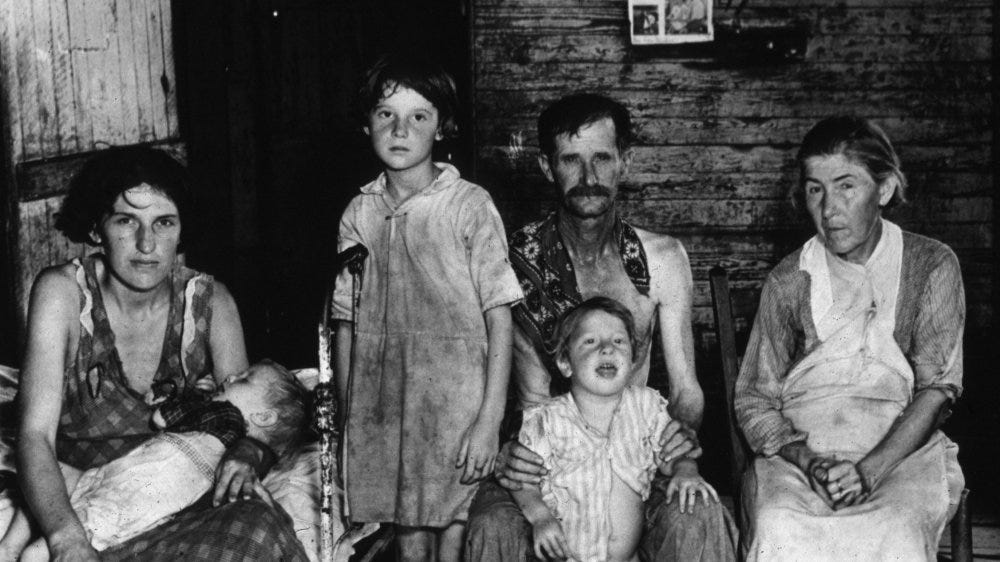Choosing death in unjust conditions: Authors Recommend Allowing MAiD for the Desperately Poor
Two authors from the University of Toronto published an interesting article:
Thanks to our paying subscribers, I shelled out $45 and purchased a PDF copy of the article so I do not go just by the abstract. This post would be impossible without you, my generous paying subscribers!
The article discusses allowing medically assisted suicides for desperately poor people who cannot afford a dignified life or expensive medical treatments.
The authors ask:
Should MAiD be available to people in such circumstances, [poor economic conditions - I.C.] even when a sound argument can be made that the agents in question are autonomous?
They answer this question using a “harm reduction approach,” which is essentially economics and evaluates the economic worth of assisted suicide for the poor.
we use a harm reduction approach, arguing that even though such decisions are tragic, MAiD should be available
Their definition of “harm reduction” is absurdly self-referential.
I highlighted the awkward attempt to define “harm reduction” in blue and underlined (in red) the only part that has a prescriptive meaning:
The authors explain that “harm reduction” is “lesser evil,” reserving the definition of “evil” for themselves.
The real reason for allowing euthanizing the poor shows up a couple of paragraphs down and is, no surprise, a financial one: Canada has a collapsing healthcare system, and euthanizing poor people “clogging hospitals” would allow more deserving individuals (note my sarcasm) to use medical services. The authors stop before saying that out loud, but this is my interpretation of why they brought up collapsing healthcare.
So, the authors argue for expanding medically assisted suicides to people who want to end their lives due to poverty. Their “harm reduction” analysis suggests, without saying so outright, that MAiD for the desperately poor would alleviate “collapsing healthcare.”
MAiD Promotes Suicide
Nobody, besides quadriplegics, needs MAiD to end their lives. A few feet of rope is all anyone needs - and there is no need to ask for anyone’s permission. The importance of MAiD is that it makes ending one’s life easy, painless, and socially acceptable. Doctor-assisted euthanasia is glorified and advertised in creepy commercials, such as the infamous “blue whale” clip:
Is Poverty a Good Reason to Allow Doctor-Assisted Suicide?
The picture below shows a poverty-stricken family during the Great Depression. The wife looks unhappy. The husband looks tired. The grandma has likely seen worse in her younger days and is completely undisturbed. What gives this picture hope is the kids, who look like they have bright futures ahead.
Should any member of the above family end their life? Who would benefit from it?
Many people, even those who are successful at some point, become poor at some other point in their lives. Life is unpredictable. People make bad financial bets, divorce, get hurt or sick, etc. The “social mobility” that we value, allowing dirt poor people to become successful, sometimes works the opposite way.
Becoming “suddenly poor” and experiencing desperate circumstances is traumatic. Help is sparse. Bills mount up. Things seem hopeless.
Imagine someone in such desperate, but possibly temporary, circumstances. Would it be helpful to have a MAiD provider show up, at the worst moment in their lives, with a fancy suicide machine and offer those people a euthanasia option? Is that even a good idea?
It is not a good idea if you ask me! There are many reasons why the authors are wrong, but the most important one is that circumstances change, and people recover or accept their new lifestyle. Incentivizing them to kill themselves robs them of giving recovery a chance.
Do you know someone who experienced desperate circumstances, with no hope whatsoever, whose life unexpectedly improved? Would those individuals possibly make a wrong choice, if given a seemingly painless option to end their lives at their worst moment?
How many lives would this “euthanasia for poor people” take needlessly?
Let me know your thoughts on this proposal by Canadian ethicists from the University of Toronto!
(and thanks again to my paying subscribers)





